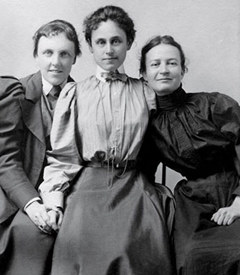Alice Hamilton
Alice Hamilton (February 27, 1869 – September 22, 1970) was an American physician, research scientist, and author who is best known for her pioneering work in the field of occupational health and industrial toxicology. She is often referred to as the founder of occupational medicine in the United States. Hamilton's groundbreaking research and advocacy led to significant improvements in workplace safety and labor laws, protecting countless workers from hazardous conditions and occupational diseases.
Early Life and Education[edit | edit source]
Alice Hamilton was born in New York City to a socially prominent family. She pursued her education with a keen interest in medicine and science, overcoming the societal barriers faced by women in these fields during her time. Hamilton earned her medical degree from the University of Michigan Medical School in 1893. Following her graduation, she continued her studies in bacteriology and pathology at universities in Munich and Leipzig, Germany, further solidifying her expertise in medical research.
Career and Contributions[edit | edit source]
Upon returning to the United States, Hamilton began her career in medical research and teaching. She joined the Hull House, a settlement house in Chicago founded by Jane Addams, where she lived and worked among the immigrant community. This experience exposed her to the poor working conditions and health hazards faced by industrial workers, sparking her interest in occupational health.
Hamilton's investigations into industrial workplaces revealed the widespread use of dangerous chemicals and practices that led to illnesses and fatalities among workers. She conducted detailed studies on the effects of lead, mercury, and other industrial poisons on the human body, documenting her findings in numerous articles and reports. Her work was instrumental in raising public awareness about occupational hazards and influenced the enactment of laws aimed at improving workplace safety.
In 1919, Hamilton became the first woman appointed to the faculty of Harvard University, where she served as a professor of Industrial Medicine at the Harvard Medical School. Her appointment marked a significant milestone for women in academia and medicine.
Legacy and Impact[edit | edit source]
Alice Hamilton's contributions to public health and occupational medicine have had a lasting impact. She played a key role in the establishment of occupational health as a distinct field of medicine and public health. Her advocacy and research led to the implementation of safety standards and regulations that have saved countless lives and improved the health and well-being of workers around the world.
Hamilton received numerous awards and honors in recognition of her work, including the Lasker Award in 1947. Despite her achievements, she remained humble and dedicated to her mission of protecting workers and promoting public health.
Selected Works[edit | edit source]
- Industrial Poisons in the United States (1925)
- Exploring the Dangerous Trades (1943)
Death and Legacy[edit | edit source]
Alice Hamilton died on September 22, 1970, at the age of 101. Her legacy continues to inspire public health professionals and advocates for workers' rights. Hamilton's pioneering work laid the foundation for modern occupational health and safety standards, making her one of the most influential figures in the history of public health.
Search WikiMD
Ad.Tired of being Overweight? Try W8MD's physician weight loss program.
Semaglutide (Ozempic / Wegovy and Tirzepatide (Mounjaro / Zepbound) available.
Advertise on WikiMD
|
WikiMD's Wellness Encyclopedia |
| Let Food Be Thy Medicine Medicine Thy Food - Hippocrates |
Translate this page: - East Asian
中文,
日本,
한국어,
South Asian
हिन्दी,
தமிழ்,
తెలుగు,
Urdu,
ಕನ್ನಡ,
Southeast Asian
Indonesian,
Vietnamese,
Thai,
မြန်မာဘာသာ,
বাংলা
European
español,
Deutsch,
français,
Greek,
português do Brasil,
polski,
română,
русский,
Nederlands,
norsk,
svenska,
suomi,
Italian
Middle Eastern & African
عربى,
Turkish,
Persian,
Hebrew,
Afrikaans,
isiZulu,
Kiswahili,
Other
Bulgarian,
Hungarian,
Czech,
Swedish,
മലയാളം,
मराठी,
ਪੰਜਾਬੀ,
ગુજરાતી,
Portuguese,
Ukrainian
Medical Disclaimer: WikiMD is not a substitute for professional medical advice. The information on WikiMD is provided as an information resource only, may be incorrect, outdated or misleading, and is not to be used or relied on for any diagnostic or treatment purposes. Please consult your health care provider before making any healthcare decisions or for guidance about a specific medical condition. WikiMD expressly disclaims responsibility, and shall have no liability, for any damages, loss, injury, or liability whatsoever suffered as a result of your reliance on the information contained in this site. By visiting this site you agree to the foregoing terms and conditions, which may from time to time be changed or supplemented by WikiMD. If you do not agree to the foregoing terms and conditions, you should not enter or use this site. See full disclaimer.
Credits:Most images are courtesy of Wikimedia commons, and templates, categories Wikipedia, licensed under CC BY SA or similar.
Contributors: Prab R. Tumpati, MD





